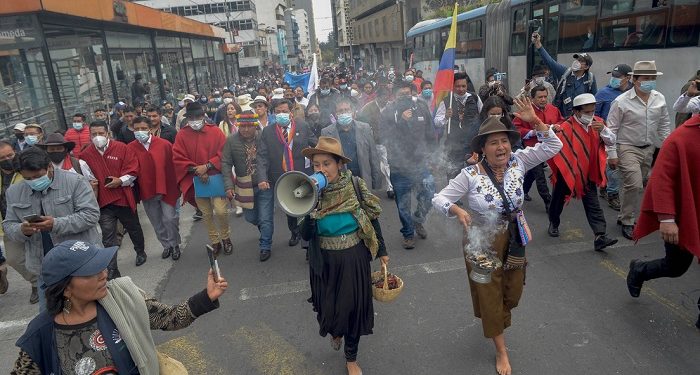By Miguel Lamas, an IWU-FI leader.
17 June 2022.
The CONAIE (National Indigenous Organisation of Ecuador), student and neighbourhood organisations and the United Workers Front (FUT) have taken to the streets against the pro-imperialist neoliberal government of Lasso, against his economic and repressive measures.
The indefinite strike with road blockades called by CONAIE began on Monday 13. University student organisations went out to demonstrate in Quito. The National Union of Educators, the Popular Front and the United Workers’ Front announced demonstrations in the coming days. The political organisation Somos Agua, headed by Yaku Pérez, also expressed its support for the popular protest and took part in the marches.
What sparked the protests was, as in the popular indigenous rebellion of 2019, the fuel increase of over 50 per cent. Domestic fuel prices are “set uncontrolled” by order of the IMF, Ecuador being a producer and exporter of fuels. The country is experiencing an economic crisis, an impossibility to cover basic needs, extractive mining destroying forests and water sources, an increase in poverty, unemployment, labour precariousness and informality, and squalid salaries. And also a crisis with mafias that control drug trafficking, and violence in prisons with hundreds of deaths.
The neoliberal government of the banker Lasso follows the orders of the IMF to pay the foreign debt, preserve the profits of multinationals and bankers, and unload the crisis on the workers. Also with repressive measures, such as a recent “Law on the Legitimate Use of Violence”, which was even supported by the Correista opposition, and which allows military repression and even the use of firearms to repress popular protests called “terrorism”. Eight members of the Guevarist Movement Land and Freedom were also arrested a fortnight ago, accused of being terrorists. And on Monday 13, Leonidas Issa, the top leader of CONAIE (native people organisation), was arrested and tried to “interrupt public services”. Another 20 students and peasants were arrested in the protests.
The marches and blockades demand lower fuel prices. Another demand is to reduce food prices, which have risen disproportionately, and effective control of speculators, no to harmful extractive mining that destroys nature, not to the privatisation of state companies, and a one-year moratorium on the financial system so that families can pay their debts; fair prices for rural products; employment and labour rights; no to mining in indigenous territories and water sources; no to the privatisation of strategic sectors, the urgent budget increase for health and education, free admission to public universities, no more indebtedness, writing off the foreign debt. There are also demands against repressive laws and for the release of those imprisoned during demonstrations. In the street protests, we hear the slogans “They should all go” and “Out with Lasso, out!
In order to win and achieve fundamental changes, it is urgent to unify and coordinate this powerful mobilisation of the working people, the unity of the organisations in struggle and to draw up a common programme of workers’, popular, indigenous and student demands, and an economic plan to achieve them. In this sense, Ecuador has the important tradition of the National Assembly of the Peoples, which, with representatives of the indigenous, popular and workers’ organisations, has met political crises, such as in 2005 and 2019. It is necessary to push forward from the grassroots, from CONAIE, the FUT and other organisations on the streets, demanding this unity from the leaders and convene the National Assembly of the Peoples to make it and plan a programme to throw out the government of Lasso and the IMF, and for Ecuador to be governed by the working people.













